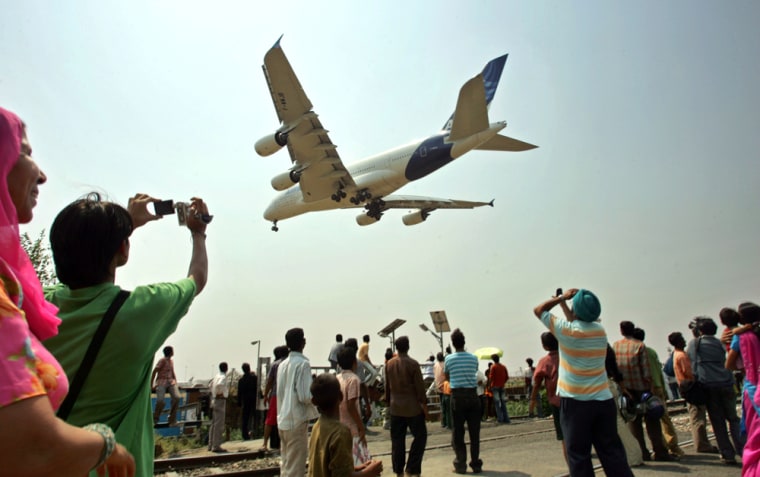If you're sitting on the tarmac, waiting for your plane to take off in Chicago or London or Asia, take heart. Things could be much worse. You could be in Brazil.
In our tallying of the world's most delayed airports, the flight hubs in that country appeared at or near the top of our lists for both late arrivals and departures. At Brasilia International Airport, the world's worst for on-time departures, slightly less than 27 percent of all flights took off within 15 minutes of their scheduled departure time in 2007, according to FlightStats, a service that tracks historical and real-time flight information.
At Sao Paolo's Guarulhos and Congonhas International Airports only 41 percent and 43 percent of all flights, respectively, left on time, making them the third and fourth worst cities for departures. (Rio de Janeiro's main airport has roughly the same miserable departure reliability, though it didn't meet our criteria because of its relatively small size.) Sao Paolo is also one of the worst places in the world for arrivals. Just 54 percent of the flights at Congonhas and 59 percent of the flights at Guarulhos arrived as scheduled last year.
Brazil, of course, isn't the only country with a poor track record for flight delays. At Beijing Capital International Airport, which is expanding in preparation for the summer Olympics later this year, just 33 percent of its flights took off on time in 2007, putting it just behind Brasilia on our list of worst departures. Egypt's Cairo International, Africa's second busiest airport behind Johannesburg, only saw 47 percent of its flights take off on time last year. The average wait: 43 minutes. And at sprawling Charles de Gaulle Airport in Paris—the worst place in Europe to catch a timely flight—barely 50 percent of its commercial passenger planes left as scheduled.
Airport authorities typically use arrival times when tracking late flights, which are considered delayed if they reach their destination at least 15 minutes behind schedule. According to conventional wisdom, pilots can make up for lost time on the ground once they're in the air. But travelers find few things more frustrating than having to wait more than necessary at their gate or on the runway. So we've included departure delays in our rankings.
Of course we looked at arrivals as well. If you flew to Mumbai or Delhi last year, more often than not your plane did not arrive on time. The international airports in those cities were the world's worst for timely arrivals. Officials from the India delegation of the International Civil Aviation Organization say modernization efforts are underway at many of the country's major airports to keep pace with India's explosive economic growth.
In the U.S., New York City has become synonymous with delayed flights as commercial and corporate jets crowd limited airspace over the city. With just 58 percent of its flights arriving on time in 2007, LaGuardia airport beat out Newark International (slightly more than 58 percent arrived as scheduled) for the worst airport in the U.S. for arrivals. They round out the top five of the world's worst airports for delayed arrivals. Incidentally, John F. Kennedy International--New York's largest airport with 44 million passengers annually—was barely behind them, with more than 40 percent of its flights arriving late.
Robert Poole, founder of the Reason Foundation and a frequent adviser to the U.S. government on transportation issues, says that, in New York, airlines have caused the delay problem by substituting smaller planes for larger ones. At JFK, the number of planes with less than 100 seats has grown by 128 percent during the last 5 years.
"The best remedy for this is to make airlines pay a market price for using the runways," says Poole. To solve the problem, the Bush administration has proposed implementing "congestion pricing," where airlines would pay an additional fee if they schedule flights during peak hours. Predictably, airlines are very much against the idea. Stay tuned, as the fight will surely heat up in 2008.
A word about the methodology of our rankings: We considered only those international airports that served at least 10 million passengers in 2006, according to Airports Council International, a Geneva-based industry group for the world's airport operators. (Data for 2007 has not yet been released). For flight arrival and departure statistics, we relied primarily on information supplied by FlightStats, which has data for all of 2007. The U.S. Bureau of Transportation Statistics and the Association of European Airlines have not yet released their flight punctuality statistics for the end of 2007, though we also examined what they do have on record for last year. Of the 100-plus airports we considered, those in European and American cities tended to have fairly mediocre records for on-time arrivals and departures.
Where are the least delayed airports in the world? Korea and Japan. Nearly 95 percent of commercial flights at Seoul's Gimpo International Airport arrived on time last year, making it the world's most efficient airport for arrivals. It was followed by Jeju International (94 percent on-time arrivals), the third largest airport in South Korea.
In Japan, Osaka Itami International airport had the most timely arrivals—just 8 percent of its flights didn't land on schedule in 2007. But the country had by far the best track record for on-time departures—six of its airports are in the top 10. Osaka Itami leads the pack, with 97 percent on-time departures in 2007; Tokyo's Haneda airport, which saw more than 66 million people pass through its terminals, was second best. Only 7 percent of the flights departed late there.
As policymakers try to figure out how to make flights more efficient in New York and other U.S. cities, seems like the obvious place to look for guidance is the Far East.
Additional reporting by Robert Malone
